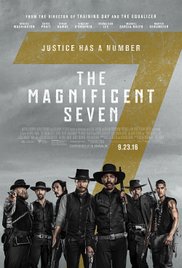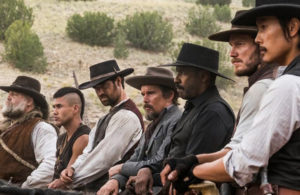 Long gone are the days when we could ask, “Why are they remaking [film name here]?” and expect a reasonable answer. Though this summer’s multiple box-office bombs might have slowed the sequel/reboot/remake fever that has gripped Hollywood over the last decade, we’re far from a cure.
Long gone are the days when we could ask, “Why are they remaking [film name here]?” and expect a reasonable answer. Though this summer’s multiple box-office bombs might have slowed the sequel/reboot/remake fever that has gripped Hollywood over the last decade, we’re far from a cure.
So let’s save considerations of “Did we need a remake of The Magnificent Seven?” No, no we did not. But it turns out this remake, directed by Antoine Fuqua (Training Day, Olympus Has Fallen) is actually pretty great. And let’s get this out of the way: I’ve never seen the much-beloved original Magnificent Seven or the original Kurosawa film Seven Samauri, on which both films are based. The new film is written by Richard Wenk (who worked with Fuqua and Magnificent Seven star Denzel Washington on The Equalizer) and Nick Pizzolatto (the mind behind True Detective).
The highlight of the film is undeniably the cast. All seven really are magnificent in their roles and – at least for one who hadn’t seen the original – surprising at times. The script is whip-smart, and the dialog lightning fast. Characters’ backstory and motivation are unspooled organically. It does feel a bit anachronistic at times. Pratt’s snark in particular occasionally feels a bit too contemporary, though it hardly detracts from the film.
Thematically, The Magnificent Seven is a mess. The cold open, which serves to introduce Peter Sarsgaard as the film’s villain, is painful – fortunately the film improves dramatcially and quickly. The fault doesn’t lie with Sarsgaard – he’s oily and excellent, lacking only a moustache to twirl to complete his cartoonish character. His opening monologue vaguely links capitalism, democracy and God (literally, he just puts them all in the same sentence). The scene happens in a church, which then gets burned down.
 It all feels like it’s going somewhere, like the film wants to say something about God – the burned out church becomes central in the third act. But – more like Pizzolatto’s second season of True Detective than the first, it just all sort of evaporates.
It all feels like it’s going somewhere, like the film wants to say something about God – the burned out church becomes central in the third act. But – more like Pizzolatto’s second season of True Detective than the first, it just all sort of evaporates.
It didn’t have to be that way. Westerns are all about the frontier, where the veneer of civilization is thin. Might makes right and law is whatever we agree it is. The constitution doesn’t reach the frontier. If the film were more careful, we might suspect Pizzolatto is making a point – that God is one more social construct that can’t survive the ugly reality of human nature.
But The Magnificent Seven isn’t sure what it wants to say. It’s too busy enjoying the razor-sharp dialog, well-employed Western tropes and blowing stuff up. And that’s not all bad. In a year of disappointing blockbusters and overly serious superhero films, it’s nice to have fun at the movies. And fun is something The Magnificent Seven delivers in spades.


1 comment